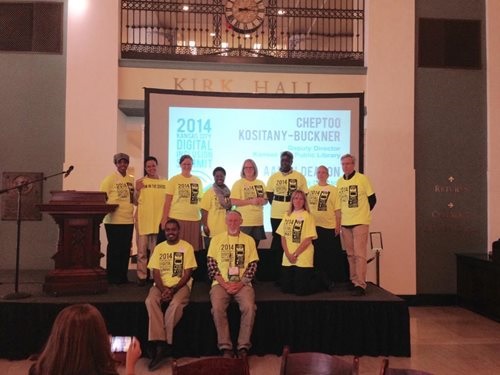This past Friday, Oct. 17, at the Kansas City Public Library, everyone who came in through the big, vaulted doors to Kirk Hall was encouraged to disconnect. To shut down their devices — or put them in airplane mode — and experience the lack of a technological tether for one whole day.
No, it wasn’t a ploy to get them to read more books. (At least, not that we’re aware of).
The unplugging stunt was part of the inaugural Digital Inclusion Summit.
Organized by the Library with help from KC Digital Drive, Connecting for Good, LINC and Literacy Kansas City, the event was designed to coalesce several years’ worth of discussion around the importance of digital access for Kansas Citians. Then, by capturing the discussion in video and on paper with help from event facilitator The Brainzooming Group, to forge concrete next steps for the newly established Digital Inclusion Coalition.
History in Brief
Digital inclusion — that is, providing access and training to information technology services so that all people can participate in a digital economy — is nothing new. Libraries have been providing public computers and training classes since the ‘80s.
However, in Kansas City, interest in the topic of digital inclusion has risen with the arrival of Google Fiber, which offers a pricing tier aimed at lower-income homes: free broadband for seven years after an initial $300 construction fee that can be spread over 12 months. Despite this and similar packages offered by competitors (such as Comcast’s $9.95 Internet Essentials package), many in the city remain unconnected.
Hence the need for some really loud t-shirts.
The goal of the event’s unplugging exercise was to get at least 17% of summit attendees to unplug. To show their support, they wore neon-yellow “I’m in the Divide” tees to represent the 17% of Kansas Citians who have no access to the Internet, according to a 2011 survey conducted by Google Fiber.
And so, as a small but brave portion of the 100 or so people inside Kirk Hall slipped on those bright t-shirts and blacked out their phones, the rest of the crowd geared up for a day full of networking, keynotes, and breakout sessions aimed at solidifying the community’s stance on an issue that touches on education, the economy, and quality of life.
2014 KC Digital Inclusion Summit from LINC on Vimeo.
Highlights & Observations
The crowd inside the library comprised a diverse cross section of organizations and institutions invested in Kansas Citians’ getting access. There were representatives from the telcos: Google Fiber, Time Warner Cable and Comcast.There were representatives from places such as public libraries and nonprofits (Connecting for Good, the Shepherd Center) that provide training to people across the digital divide. There were economic development stakeholders, community college teachers and administrators, and more than a few concerned citizens.
In addition to an inspiring keynote from national digital inclusion expert Angela Siefer on how KC can learn from other cities’ successes (view her presentation here), the day offered 14 breakout panel discussions on topics including:
- How public wifi and mesh networks can be used to give internet access to wide swaths of the community.
- How educators can get free resources to assist with digital literacy training.
- How cable companies are providing affordable broadband to families across the divide.
- How to get youth interested in computing.
- How to narrow the digital divide for seniors.
- How digital inclusion is an issue for economic and workforce development.
Key Takeaways
Some of the takeaways I collected from the event (and if I missed any, please post a comment adding your own) were:
- Digital inclusion is about more than giving people access to technology. It’s also about teaching them how to use it.
- In order to successfully raise awareness among civic and business leaders and convert them to supporters of digital inclusion initiatives, these initiatives must be tied to economic outcomes.
- It’s incumbent on the community, not providers such as Google Fiber or TWC/Comcast, to develop digital inclusion solutions.
- Measurement and reporting are crucial to demonstrating the success of digital inclusion initiatives.
Wrapping up the event, KC Digital Drive’s managing director, Aaron Deacon, gave a quick overview of work KCDD has been doing to develop a framework for a metro-wide digital inclusion plan. (More to come on that study soon.)
View tweets and images from the event.
Raising Awareness
In the end, if the mood and energy at the Summit were any indication, digital inclusion is on its way to becoming a much hotter topic in Kansas City. But even when it comes to the awareness factor, there’s still a long way to go.
As Google Fiber’s community manager Rachel Merlo observed, “No one’s hosting a gala for digital inclusion.”
Hopefully that day will come soon.

